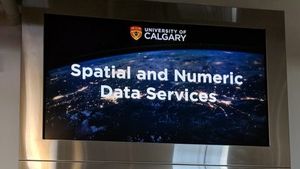Andy Powell, network resident, has an interesting post about his ‘fractured’ network identity. How does he define identity?
“Digital identity is the online representation of an individual within a community, as adopted by that individual and/or projected by others. An individual may have multiple digital identities in multiple communities.” [Andy Powell, eFoundations]
He describes how his digital identity is ‘fractured’ across many environments (FaceBook, Flickr, various home pages and blogs, Second Life, twitter, etc). Various professional or personal affiliations are explicitly visible in several ‘friendspaces’ (my word), on FaceBook and Twitter for example. Andy even confesses to an ‘identity crisis’ around his second life identity, Art Fossett.
I also have something of an identity crisis around Art Fossett – specifically concerning how closely the digital identities of Andy Powell and Art Fossett should be related. [eFoundations: define:digital identity]
Reading the entry, it seemed to me that Andy is talking about ‘centering’ this ‘decentralized identity’ in various ways: he talks about wanting to ‘consolidate’ his network presence.
(John Breslin schematically represents decentralized identity in a blog entry of some time ago.)
There are various centering or consolidating strategies …
Andy talks about limiting the number of ‘handles’ his identity has – email addresses and user names, although he is not in a position where his personal identities can override his current work identity (at Eduserv).
He is working to center his network presence at https://andypowe11.net/ and has some interesting comments about steps taken or to be taken. These include the suggestion that his former place of work put redirects from historically superseded network presences to his current one so that he can capture their ‘Google juice’, which raises interesting questions about our view of the historical record on the web.
He also has some advice about the use of third party services, about control of domain names, and about where you build up ‘google juice’ as moving it may be outside of your control.
Several things struck me reading this post …
- Andy’s concerns here are probably in advance of most people’s, but it seems clear that managing our network presences and the relationships between them is becoming of more interest. And this cuts across previous boundaries – between work, family and friends, for example – in different ways.
- My network identity is less decentralized than Andy’s: overall, I am less residential 😉 Until recently, I would have seen this ‘fracture’ as simply a part of an ongoing transition into new ways of doing things. And I wouldn’t have had the patience or the inclination to adopt various centering strategies. That said, I have been more conscious recently of where I want my network presence to be ‘signed’ and where I don’t. To take an example close to home, I wrote some longish reviews on items in Worldcat; recently, I realised that I would like the system to be able to support in some way my assertion that I was their author, and now it does by linking to a profile page. I have tended to use lisld as a handle in a variety of places. Now, I would probably more consistently use something like LorcanDempsey where I was more concerned about ‘signature’, although I am quite attached to lisld 😉
- Of course, Google is a strong bottom-up centering service (see Tony Hirst’s interesting suggestion that an institution’s de facto home page is the first page of Google results in a search for that institution). My first-page Google results tend to be dominated by this blog, but there are also current and previous work pages, some articles come and go, and more recently Wikipedia and Facebook make a showing. None of these is at a domain name controlled by me. This blog was established as an internal OCLC communications tool for a year before it was externalised so it is ‘located’ at OCLC (in several ways). Now, I am sure that it gets a ranking ‘lift’ from the OCLC domain name, but it also means that I cannot bring it with me as it now stands if I ever leave. In a sense, I lose some of that network capital. Of course this is quite reasonable from another view, but it does raise interestingly the balance between individual and institution.
- My name is not unique. However, it is not very common. Andy notes his ‘Google nemesis’, Andy Powell of Wishbone Ash. It would be interesting to know more about what the impact of findability in Google has been on the naming of children.
- Now, I know that there are various initiatives underway which may make our identities more portable. I assume – hope – that we will end up with the ability to port our identities flexibly, but that we also retain the ability to support decentralised identities which may not know very much, or anything, about each other 😉


